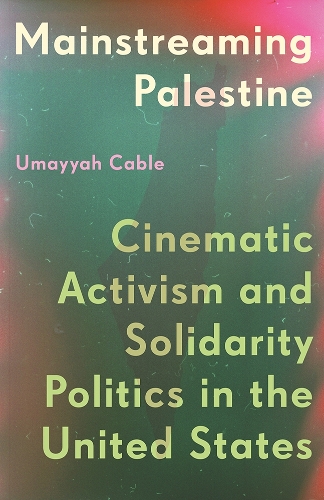
Mainstreaming Palestine: Cinematic Activism and Solidarity Politics in the United States
(Paperback)
Available Formats
Publishing Details
Mainstreaming Palestine: Cinematic Activism and Solidarity Politics in the United States
By (Author) Umayyah Cable
University of Minnesota Press
University of Minnesota Press
21st January 2026
United States
Classifications
Professional and Scholarly
Non Fiction
Media studies
791.43658
Physical Properties
Paperback
272
Width 140mm, Height 216mm, Spine 14mm
312g
Description
A history of cinema's role in popularizing the politics of Palestinian liberation
For decades, Arab American activists and allies have used film, video, and multimedia to mobilize support for the Palestinian cause in the United States. In this detailed history of cinema's role within the broader solidarity movement, Umayyah Cable analyzes the various strands of cinematic activism that have helped move Palestinian liberation politics from the periphery and into the mainstream.
Cable charts the shifting discourse around Palestine as it has been shaped by grassroots film production and alternative media distribution networks as well as more conventional outlets. Ranging from the circulation of educational filmstrips by the Association of Arab American University Graduates in the 1970s to the treatment of Palestinian solidarity at contemporary Hollywood awards ceremonies and film festivals, Mainstreaming Palestine tells the story of how cinema has promoted Palestinian liberation and solidarity politics. While highlighting various public controversies and struggles against censorship, Cable also acknowledges the drawbacks of the Palestinian cause being subsumed by the mainstream, discussing how activism risks becoming fashionable, undermining the radical potential of the very tools that helped bring it there.
Combining archival research, ethnographic observation and interviews, text analysis, and visual analysis of film, video, and multimedia, Mainstreaming Palestine encourages readers to critically assess the relationship between the politics of liberation and the all-consuming engine of contemporary capitalism. By underscoring the impact of visual media on the evolution of the Palestinian solidarity discourse, this book offers both a treatise on the practical power of cinema and a necessary historicization of an urgent issue in American politics.
Author Bio
Umayyah Cable is assistant professor of American culture and film, television, and media at the University of Michigan, Ann Arbor.
